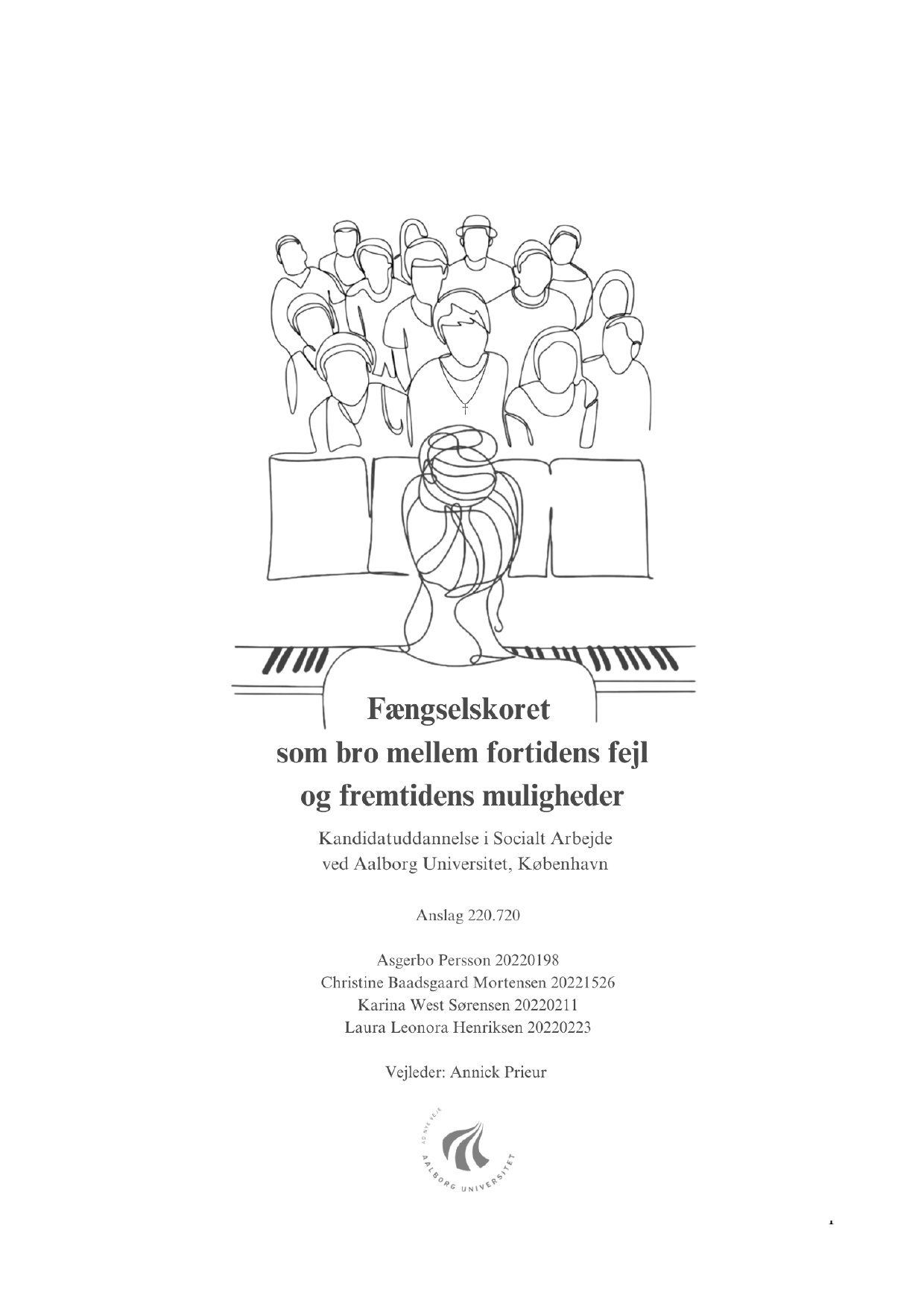
Fængselskoret som bro mellem fortidens fejl og fremtidens muligheder
Oversat titel
Prison Choir as bridge between past offenses and future opportunities
Forfattere
Semester
4. semester
Uddannelse
Udgivelsesår
2024
Afleveret
2024-05-31
Antal sider
92
Abstract
Titel: Fængselskoret som bro mellem fortidens fejl og fremtidens muligheder Koret, har igennem de sidste 30 år tilsyneladende haft en afgørende betydning for kormedlemmerne, både indenfor og udenfor fængslets mure. I dag står koret som en forankret del af Kriminalforsorgens frivillige tilbud til indsatte, der afsoner en dom. Civilsamfundet er for første gang skrevet ind i det politiske udspil for Kriminalforsorgens resocialiserende arbejde. Udenlandske undersøgelser tyder på at frivillige tiltag som fængselskor, kan bidrage til resocialiseringsprocessen. I dansk kontekst findes der ikke empirisk funderet undersøgelser på området, hvorfor vi ser det relevant at undersøge det danske fængselskors potentiale ift. tilbagevenden til samfundet. Formålet med specialet er derfor at undersøge, hvordan deltagelse i Fængselskoret kan påvirke de indsattes identitet, tilhørsforhold og mulige udvikling, og hvilken betydning dette kan have for resocialiseringsprocessen. Metodologisk anvendes en kvalitativ tilgang med vægt på handlingshermeneutikken. Empirien er indsamlet gennem ikke-standardiserede- og semistrukturerede interviews, deltagerobservation og fokusgruppeinterviews. De empiriske fund sættes op mod en række teoretiske og praktiske perspektiver for at forstå korets position og rolle som et potentielt socialt og resocialiserende miljø i fængslet. De praktiske perspektiver afspejles henholdsvis gennem Kriminalforsorgens foretrukne metode Risk-Need-Responsivity model (RNR) og alternativet The Good Lives Model. Undersøgelsen viser, at deltagelse i koret kan have en positiv indvirkning på de indsattes identitet, tilhørsforhold og personlige udvikling – dette særligt funderet i de relationelle fællesskabsorienterede aspekter. Koret fungerer hertil som en institution i fængslet, der udfordrer fængslets strukturelle rammer og skaber et miljø, hvor indsatte kortvarig kan frigøre sig fra deres stigmatiserede position. Koret som fælleskabende er dog også en skrøbelig størrelse, da det både er betinget af korlederens og kormedlemmernes indbyrdes gensidige engagement og bidrag. Koret, som civilsamfundsindsats, kan bidrage supplerende til Kriminalforsorgens standardiserede programmer, hvilket rejser spørgsmålet om hvilken fremtidig rolle civilsamfundet skal spille i det resocialiserende arbejde. Nøgleord: Resocialisering, fængselskor, socialt arbejde, civilsamfund, Kriminalforsorgen.
Title: Prison Choir as bridge between past offenses and future opportunities Over the past 30 years, the choir has seemingly played a pivotal role for its members, both within and beyond the prison walls. Today, the choir stands as an integral part of the Danish Prison and Probation Service's offer to inmates but is also linked to the voluntary initiative Café Exit, which focuses on aiding former inmates reintegrate into society. For the first time, civil society has been explicitly included in the political agenda for the resocialization efforts of the Prison and Probation Service. International studies suggest that voluntary initiatives such as prison choirs can contribute positively to the resocialization process. However, in the Danish context, there is a lack of empirically grounded research in this area, which highlights the relevance of investigating the potential of the Danish prison choir in relation to reintegration into society. The purpose of this thesis is therefore to examine how participation in the Prison Choir can influence inmates' selfidentity, sense of belonging, and potential development, and what significance this may have for the resocialization process. Methodologically, a qualitative approach is employed with an emphasis on action hermeneutics. The empirical data has been collected through non-standardized and semi-structured interviews, participant observation, and focus group interviews. These empirical findings are analyzed on the basis a range of theoretical and practical perspectives to understand the choir's position and role as a potential social and resocializing environment within the prison. The practical perspectives are reflected through the Prison and Probation Service's preferred method, the Risk-Need-Responsivity model, and the alternative The Good Lives Model. The study reveals that participation in the choir can have a positive impact on inmates' identity, sense of belonging, and personal development, particularly rooted in the relational, communityoriented aspects. The choir acts as an institution within the prison that challenges the structural constraints of the prison environment and creates a space where inmates can momentarily free themselves from their stigmatized positions. However, the choir as a community-building entity is also fragile, as it relies on the mutual engagement and contributions of both the choir leader and its members. As a civil society initiative, the choir can complement the standardized programs of the Prison and Probation Service, raising the question of the future role civil society should play in resocialization efforts. Keywords: Reintegration, prison choir, social work, civil society, Correctional Service
Emneord
